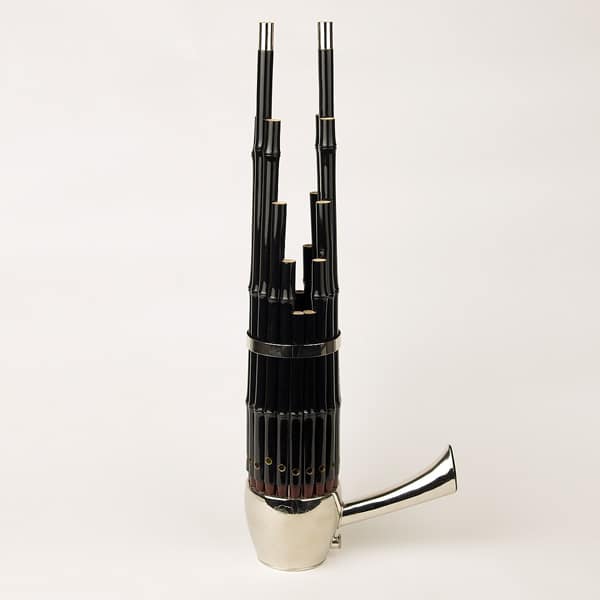In 1985 won Unsuk Chin (Seoul 1961) de Gaudeamus Muziekprijs met Spektra voor drie celli, zes jaar later brak ze door met haar voor het Nieuw Ensemble gecomponeerde Akrostichon-Wortspiel voor sopraan en ensemble. In 2004 won ze de Grawemeyer Award, de meest prestigieuze muziekprijs ter wereld, in 2007 maakte ze diepe indruk met haar opera Alice in Wonderland. Morgen, donderdag 22 oktober plaatst het Nieuw Ensemble haar centraal tijdens het concert Visioenen van kleurenpracht in het Muziekgebouw aan ’t IJ. Vijf vragen aan Unsuk Chin.
U groeide op in Seoul, welke rol speelde muziek in uw opvoeding?
‘Mijn vader was dominee en we hadden thuis een piano maar geen platen. De bevolking van Korea was in de jaren zestig en zeventig heel arm, maar ik kende gelukkig een paar mensen die een pick-up hadden en langspeelplaten met klassieke muziek. Ik ging vaak naar hen toe om die te beluisteren. Het modernste stuk dat ik kende was Petroesjka van Stravinsky, maar ik stond erg open voor alles wat nieuw was, zelfs als ik het vreemd vond klinken.
Ik was trouwens ook gek op Brahms en Tsjaikovski, maar anders dan mensen vaak denken, groeide ik niet op met de klanken van Koreaanse traditionele muziek in mijn oren. Ik hoorde enkel in de verte soms een saenghwang, de Koreaanse variant van de sheng, een mondorgel dat verwant is aan de westerse mondharmonica.’

U studeerde compositie bij Sukhi Kang aan de Universiteit in Seoul. Hoe was dat?
‘Kang liet mij kennis maken met de muziek van de westerse klassieken, maar ook met het werk van avant-gardisten als Karlheinz Stockhausen, Iannis Xenakis en Pierre Boulez. Dat was totaal nieuw in Korea, dergelijke muziek kenden wij niet. Hij bracht niet alleen opnames voor ons mee, maar ook partituren. Ik slurpte al deze invloeden begerig op.’
In 1985 won u de Gaudeamusprijs en daarna studeerde u bij György Ligeti in Hamburg. Wat heeft dat voor u betekend?
‘Het was heel eervol, maar betekende ook een enorme schok voor mij. Toen ik Ligeti de composities voorlegde waarmee ik prijzen had gewonnen riep hij uit: ‘Gooi alles maar weg, er zit niets origineels in!’ Ik was ontzettend teleurgesteld, maar diep van binnen wist ik dat hij gelijk had, want ik had nog niet werkelijk een eigen stem gevonden. Door dat besef raakte ik in een compositorische impasse die drie jaar duurde. In deze periode speelde ik veel piano, vooral stukken van Chopin, Schumann, Skrjabin en Scarlatti.’
In uw composities grijpt u soms terug op Koreaanse traditionele muziek, u wordt vaak een Koreaanse componist genoemd. Wat vindt u daarvan?
‘Dat komt mij welhaast absurd voor, want wat is nou ‘Koreaanse muziek?’ Er bestond ooit wel traditionele muziek in Korea, maar die verbinding is al lang geleden afgebroken en zij hoort bij andere maatschappelijke structuren. Eind jaren tachtig, begin jaren negentig had je vooral in Duitsland een sterk verwachtingspatroon van wat voor soort muziek je als buitenlandse componist moest schrijven. Als je uit Korea kwam, werd je geacht Koreaanse volks- of kunstmuziek te verwerken. [Tweet “Unsuk Chin: ‘Wat is nou Koreaanse muziek?'”]
Anders ging men ervan uit dat je de compositieregels volgde van de typisch Duitse avant-garde. Voldeed je niet aan die verwachtingen. dan werd je geboycot. Niet bewust, dat gebeurde onbewust. Maar ik vind het sowieso gevaarlijk een strikte grens te trekken tussen moderne en vóór-moderne muziek, het gaat mij om kwaliteit en originaliteit. Absolute moderniteit is ook een dogma, ik verzet me tegen die manier van denken. Ik wil als individu waargenomen worden en mijn eigen muziek componeren. Ik schrijf toch ook geen ‘Duitse muziek’, hoewel ik al meer dan de helft van mijn leven in Duitsland woon?’
Welke rol speelt Nederland in uw carrière?
‘Die is heel belangrijk! Holland is opener voor nieuwe muziek dan andere landen. Mijn carrière is hier begonnen en mijn muziek wordt hier nog altijd het vaakst uitgevoerd. Het concert met het Nieuw Ensemble voelt voor mij als thuiskomen’.
Dit artikel is gebaseerd op gesprekken die ik met Chin voerde in 2010, 2011 en 2012.
In 2014 verscheen een cd met drie soloconcerten van Chin, die ik bovenaan mijn toplijst mooiste opnames plaatste.

